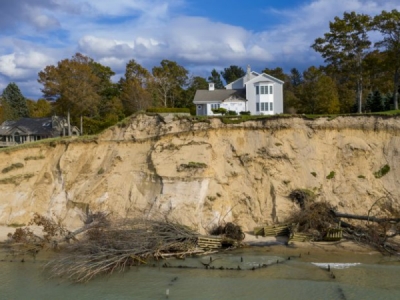
Posted on February 10, 2020
Images of green ooze flowing onto a Metro Detroit highway and homes sliding down the eroding shores of Lake Michigan speak to Michigan’s environmental pressures.
So does a $69.5 million settlement negotiated with a corporate polluter to bring clean water to 1,000 homes north of Grand Rapids.
Each of those examples form the foundations for $64 million in environmental initiatives that Gov. Gretchen Whitmer wants to fund in 2021.
Whitmer will announce that funding plan at 10:30 a.m. Thursday as she unveils a $61.9 billion executive budget proposal for the next fiscal year.
The $11 billion general fund portion of that budget will include, according to the state:
- $40 million for local climate resilient infrastructure grants for local units of government to help plan for and prevent the negative impacts of Michigan’s changing climate conditions like high water levels.
- $4 million for legal efforts within the Attorney General to protect residents from chemical contamination of drinking water and commercial pollution.
- $20 million for rapid environmental contamination response to provide additional resources for the abatement of contaminated properties across the state.
The largest piece of that comes weeks after elected officials from across the state testified in front of the state Legislature, detailing their pressures as climate change affects shorelines, roadways, and drainage systems. Their messages: They don’t have the funding to deal with the scope of the problem.
In the budget proposal, the state acknowledges the need to fix what’s already happened in Michigan along many of the 3,288 miles of Great Lakes shoreline.
“Michigan is currently experiencing the effects of record high water levels on the Great Lakes that are eroding beaches and coastlines, imperiling homes, flooding roads, and impacting the delicate balance between our prized freshwater resources and the way of life in our local communities,” according to the budget proposal.
“Severe weather events and flash flooding have also overwhelmed local sewer systems, and damaged homes and agricultural lands. The reality of these events cannot be ignored, and Michigan and its local communities must be prepared for and take action to address both immediate and future impacts of these conditions.”
The $30 million in infrastructure grants can be awarded to local units of government or regional councils, with a $2.5 million limit per grant. A 20-percent local match will be required.
Eligible projects may those that address flooding, coastline erosion, transportation networks, urban heat, and storm water management, the state said.
The $10 million in planning grants will let some communities focus on the future. Plans that can be funded up to $200,000 include:
- Local climate action plans.
- Resiliency plans for communities impacted by high water levels and coastal erosion.
- Resiliency plans for communities with undersized infrastructure such as culverts or sanitary storm sewers.
- Zoning/planning ordinances for communities to prevent climate impacts and adopt climate mitigation tools.
Michigan’s water levels became a statewide concern by summer 2019. The Great Lakes experienced record high water levels, with depths ranging from 14 inches to nearly 3 feet above long-term averages. At the same time, high underground water tables meant residents nowhere near lakes are experienced water in their basements and flooded and failing septic systems and sewage drain fields.
“It’s important to reiterate that it’s not just one lake that is experiencing record highs,” Keith Kompoltowicz, chief of watershed hydrology for the Detroit District of the U.S. Army Corps of Engineers, told MLive.
Since then, heavy rains in November prompted more flooding concerns and kept lake levels at peak, even as forecasts call for potential record-setting lake levels in 2020.
Last week, a group of legislators asked Whitmer for a “state of emergency” declaration that could release emergency state resources to address the impacts of erosion. Such a declaration also could allow the state to petition the federal government to do the same, according to the letter authored by state Rep. Bradley Slagh, R-Zeeland.
On the chemical contamination side, details were not available ahead of the budget announcement on the funding plans for the Attorney General’s office or the contamination response.
But the state recently filed suit against 17 chemical companies that it said is connected to the PFAS contamination reaching the drinking water of at least 1.9 million residents. That effort includes a contingency-fee partnership with a group of litigators who are working with state attorneys.
And news of the “green ooze” leaking from a known contamination site in Madison Heights prompted widespread concern about how the state prioritizes cleanup, in addition to calls for Michigan to increase polluter pay regulations.
In addition to proposing the targeted environmental funding, state officials said, Whitmer’s budget proposal also will target investing in children’s education and families and their health.
Source: mlive.com





